- The Eagle Flies On Friday/Girl Trouble (CBS 202632) 1967 issued as 'The Exceptions'
- Garberdine Saturday Night Street Walker/Sunday Night At The Prince Rupert (CBS 2830) 1967
- Rub It Down/It's Snowing In The Desert (President PT 181) 1968
- Helicopter/Back Room (President PT 205) 1968
- Tailor Made Babe/Turn Over The Soil (President PT 218) 1968
- Jack Rabbit/Keep The Motor Running (President PT 236) 1969
- Pendulum/Don't Torture Your Mind (President PT 271) 1969
- The Exceptional Exception (President PTLS 1026) 1969
The Exception
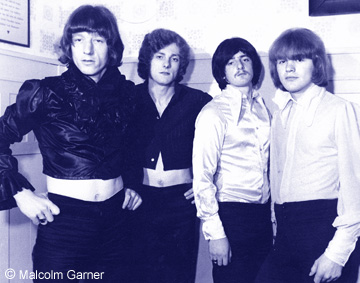
BIRMINGHAM
Revised January 2015
Alan "Bugsy" Eastwood lead vocal, drums, vibes, harmonica, guitar
Roger Hill lead guitar, drums, vocal
Dave Pegg bass guitar, vocal (left in 1967)
John Rowlands bass guitar, vocal (joined 1967, left 1968)
Malcolm Garner bass guitar, vocal (joined in 1968)
Steve Yetson saxophone, piano (joined in 1968)
"The Eagle Flies On Friday"
While The Exception were well-known locally, toured Europe, and recorded an album along with several innovative singles, they were unable to attain the level of success worthy of the collective talents within the band. The core of the group consisted of drummer Alan "Bugsy" Eastwood and guitarist Roger Hill who were both former members of The Brumbeats.
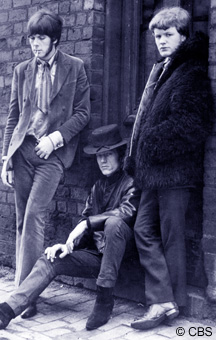
A blues-based line-up known as 'The Hooties' were formed in Birmingham during the summer of 1966 with guitarist Roger Hill, Alan "Bugsy" Eastwood on drums, and Tony Clarkson on bass guitar. Alan and Roger had previously played together in The Brumbeats with Roger later joining Steve Gibbons in The Uglys. Dave Pegg (also from The Uglys) was recruited to replace Tony Clarkson who left later that year and went on to join World Of Oz. The idea at the time was to create a trio along the same lines as Eric Clapton's 'Cream'. Rehearsals at Bugsy's house near Spaghetti Junction soon resulted in a very tight-sounding line-up.
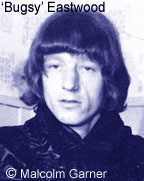
The Hooties played many of the well-known local venues including Old Hill Plaza, The Ritz (King's Heath), and The Belfry (Sutton Coldfield). They exploited their instrumental skills on-stage by sometimes swapping instruments in addition to Alan also playing harmonica or vibes as well as playing drums and singing lead vocals at the same time!
In addition to performing blues standards and radio hits, Alan Eastwood began composing original material for the band. One of Dave Pegg's friends was future Led Zeppelin star Robert Plant who at the time was contracted to CBS Records. Robert recommended The Hooties to well-known music publisher Eddie Kassner which gained the band a recording contract with CBS.
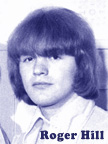
Re-naming themselves 'The Exceptions' their first single release was recorded at Regent Sound studios in London. Robert Plant actually played tambourine on the A-side titled 'The Eagle Flies On Friday' which was a powerful drums and vibes driven track. This, along with the B-side 'Girl Trouble' were both original compositions by Alan Eastwood.
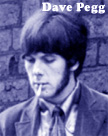
Dave Pegg recalled when interviewed by Laurie Hornsby for his excellent book 'Brum Rocked On!' that; "Bobby Hill (Roger's brother) had a brainwave to 'buy' the record into the charts so he toured the shops buying our record by the box full." Unfortunately, the New Music Express and Melody Maker had just been alerted about this type of activity so the retail figures for that week were ignored! The record did however attract interest in Germany where the band performed it live on the popular TV show 'Beat Club'. For whatever reason, The Exceptions' popularity in that country seemed to always exceed the support they had in the U.K.
"Sunday Night At The Prince Rupert"
A second inventive single titled 'Gaberdine Saturday Night Street Walker' also composed by Alan Eastwood was issued with the band's name now shortened to 'The Exception'. Interestingly, the B-side was a snappy instrumental composed by Roger Hill and Dave Pegg titled 'Sunday Night At The Prince Rupert' as a tribute to the Prince Rupert Pub in Nechells where the band enjoyed a regular, although somewhat rowdy, following.
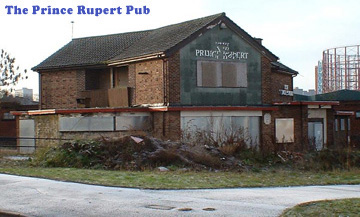
After the Exception's second single failed to chart, CBS released the band from their contract. At this point, Dave Pegg decided to leave and join Brum group 'The Way Of Life' who had future Led Zeppelin drummer John Bonham in their line-up. Dave Pegg later exchanged his electric Fender bass for a stand-up acoustic one when he joined Birmingham's own The Ian Campbell Folk Group. A year later he joined the famous British folk group 'Fairport Convention'.
Paul Lockey from Robert Plant's recently split 'Band Of Joy' auditioned as Dave's replacement in The Exception. He recalls; "Rob Plant probably recommended me. We played at the Cofton Country Club with that low wooden stage that gave the bass a great thud with two cabs firmly rooted to the floor. Bugsy Eastwood was on drums and Roger Hill on guitar. It was a good night. Robert came, and it was straight into blues and standards. I think Robert had a sing too."
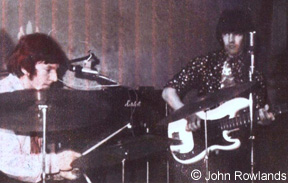
As it turned out, John Rowlands who had played bass guitar in local bands 'The Boll Weevills' and 'The Seed' was also auditioned as Dave Pegg's replacement. According to John; "Geoff Nicholls and myself went along to The Cedar Club. We were mingling with mates when Geoff said Alan Eastwood and Roger Hill were in the club asking about me. Coming over from the bar, Roger and Bugsy asked if I was fixed up with a band yet? The next morning, Roger and Bugsy appeared at my home with copies of their records for me to learn the numbers."
"I went the following day to the community rooms in Birdbrook Road where there were several other bass players to be auditioned. I set my gear up and did my bit. Roger and Bugsy both seemed impressed but asked me to wait until they heard the rest of the lads. After some time they asked me to go through the numbers again so we did. Then they said "Okay John, when would you like to start?" John Rowlands rehearsed with Bugsy and Dave all that week before playing his first gig with them at the BRS Hall in Bromford Lane, Erdington. "Dave Pegg turned up to see how we all got on. He really enjoyed what he heard and wished me well with the venture" said John.
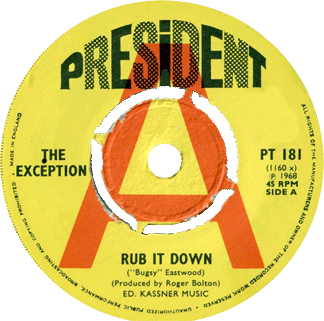
Eddie Kassner still had a lot of faith in The Exception and in particular Alan Eastwood's song writing potential. Eddie signed the band to his own 'President Records' label after enjoying success with The Equals who had got to Number One with 'Baby Come Back'. The Exception's first single for President in March 1968 sounded more like a novelty number. The catchy 'Rub It Down' was a full-blown ska/reggae attempt complete with Bugsy's impersonation of a West Indian accent! To promote it, the band had a full diary of non-stop gigs including regular bookings at Mothers in Erdington, every Wednesday at The Marquee Club in London together with touring Wales and Scotland.
John Rowlands remembers; "I met Sheelagh, my wife-to-be when she turned up to see us at the Chateau Impney. You can say it was love at first sight. The Exception were booked to go on tour with The Equals to Germany, Holland and Belgium and to appear on Bremen TV's equivalent to 'Top Of The Pops' and what a line up it was - The Steam Packet featuring Julie Driscoll, Brian Auger Trinity with Long John Baldry and Rod Stewart, The Hollies, The Equals, The Cream, The Move and of course ourselves. It was presented by Dave Lee Travis - not a bad line-up!"
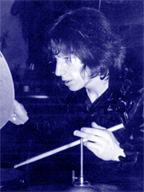
More excitement followed after the show; "Most of the acts met up in a night club where we had been booked to appear. As the night went on, Dave Lee Travis started to call up various musicians onto the stage. There we were - Roger Hill on drums, Eric Clapton on guitar, Ginger Baker drums, Bugsy on harmonica and vibes, Tony Hicks on guitar, Alan Clarke on vocals and myself on bass. To crown it off, Long John Baldry joined in too. That gig is one I shall NEVER Forget" recalled John Rowlands.
Upon returning to the UK, The Exception continued a hectic touring schedule but soon discovered their management had under-paid the band to offset the cost of recording and promoting their latest single. This did not sit well with John Rowlands who challenged Eddie Kassner's management contract which resulted in John leaving the band. "I had become totally disappointed with the whole music industry and in 1968 said I would never play in public again."
By this time another Exception single titled 'Helicopter' had been issued so no time was wasted in selecting John's replacement. Following a recommendation from Dave Pegg, bass guitarist Malcolm Garner joined in September 1968 by which time the band had relocated to London. Malcolm had previously played in Brum bands The Andicaps and the Jasper Stubbs Gloryland Band. Saxophone player Steve Yetson also joined the line-up to help fill out the sound on-stage. Malcolm recalls; "We lived at the Madison Hotel, Sussex Gardens in Paddington. From there we undertook two extensive tours of Germany including West Berlin which was a big deal in those days."
"We were scared stiff when we went to East Berlin via 'Checkpoint Charlie' and the Soviets wouldn't let us return to West Berlin!"
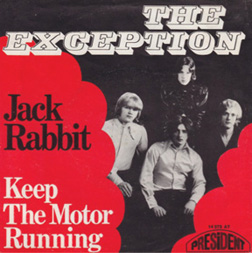
The German tours left lasting memories for Malcolm Garner; "At a gig in Lansdberg near Munich, we were contacted by members of the Landsberg Blues Club who wanted lots of blues so we obliged. Gigs in West Berlin were memorable because of the trip through the GDR and hassles with Soviet soldiers. We were scared stiff when we went to East Berlin via 'Checkpoint Charlie' and the Soviets wouldn't let us return to West Berlin!"
Despite recording and releasing more Alan Eastwood composed singles including the excellent 'Jack Rabbit', chart success still eluded the band. Alan also had his own solo single issued on President in mid 1968 titled 'Blackbird Charlie'. In light of this it seems strange then that Eddie Kassner had The Exception record an entire album that was released early in 1969.
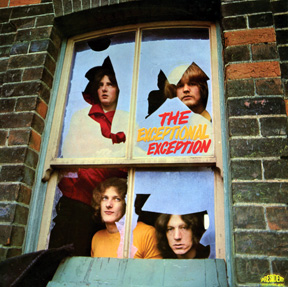
The LP titled 'The Exceptional Exception' was filled with Alan Eastwood compositions, most of which seemed lyrically biographical and some such as 'Woman Of The Green Lantern' and 'Mrs. Cocaine' reflecting a much darker side of his imagination or experience. The sole "exception" was Roger Hill's psychedelic-styled 'Don't Torture Your Mind' that seemed to echo a trend now past. The album stands up on its own as a fine collection of original songs but without a hit single to promote it, there was little chance for much exposure.
Alan "Bugsy" Eastwood left The Exception shortly after the album's release. Roger Hill took over on lead vocal and another drummer was enlisted for yet another German tour. The revised line-up was well-received on the tour but it wasn't the same anymore. Malcolm says; "We found another drummer but of course he was no replacement for Bugsy and the band split in May 1969. That's when I went to Germany with my German fiancee Ulrike, learned the lingo and stayed". In retrospect, it seems The Exception experienced their greatest success as an energetic blues/R&B act - something their record company failed to capitalize on and instead had them record singles aimed towards a pop audience.
Roger Hill was enlisted by former Move front-man Carl Wayne to join his new backing group known as 'Mongrel' but tours proposed for the line-up never materialized. After they had recorded an album, Roy Wood recruited most of the band to form his own chart-topping 'Wizzard'. Roger then re-joined his former band-mate Dave Pegg as part of the Fairport Convention line-up for a tour of the U.S.A. He later embarked on a long career as a jazz guitarist to which his talent was well suited. In later years, he formed his own 'Roger Hill Band' with whom he performed around the Birmingham area. Roger Hill passed away at age 66 in November 2011 (see BrumBeat Roger Hill feature).
John Rowlands after leaving The Exception, retired from music to start a business with his wife. "I became employed in the DIY industry and went on to start 'Castle Kitchen and Bathroom Design' successfully supplying and installing products into homes for 29 years. We retired in 2006 and now enjoy life by getting out and about in our motor home. Sheelagh does tend to nag a lot though by saying; Please play your guitar for me John, it would be music to my ears!"

Malcolm Garner still lives in Germany with his wife Ulrike. He continues to play music and has fond memories of his time in The Exception. "It seemed like a good deal - all expenses paid, weekly salary, recording, management and agency contracts. What more could four kids from the provinces ask for?" he says.
And what of Alan "Bugsy" Eastwood? Sadly, he was to battle alcohol and drug addiction over the years but stayed with President Records and with them recorded a solo album titled 'Seeds... Alan James Eastwood' issued in 1971. Although a wonderful collection of deeply-personal original songs, this album (like The Exception's) was largely ignored. Note: this album is now issued for the first time on CD by Cherry Tree Records (CRTREE015). See the RPM/Cherry Red Records web site at www.rpmrecords.co.uk for details.
Alan Eastwood continued to work in the music business and spent his later years in London where he lived until his death from heart failure on October 25, 2007. He never really got the recognition he deserved but was always well respected for his music and volunteer work in the local community. His former Brumbeats band-mate Graham Ashford wrote a fitting tribute to Bugsy after his death; "I remember days when we were younger, we used to laugh and sing the whole night long. Someday I will greet you as I find you, with the sharing of a brand new song."
This story of The Exception was written with assistance from John Rowlands, Malcolm Garner, Paul Lockey, John Reed, and Graham Ashford with references from Laurie Hornsby's book 'Brum Rocked On!' This web page is dedicated to the memory of Alan Eastwood and Roger Hill.
Copyright © John R Woodhouse
The Exception 1960s Record Releases
Singles:
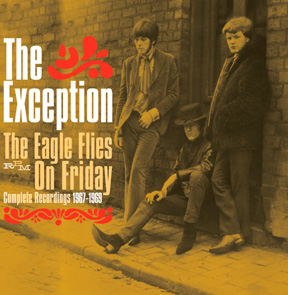
Album:
To see an exclusive and in-depth review of 'The Exception - The Eagle Flies On Friday - The Complete Recordings' CD issued on RPM Records, click HERE. You can visit the RPM/Cherry Red Records web site at www.rpmrecords.co.uk for more details.